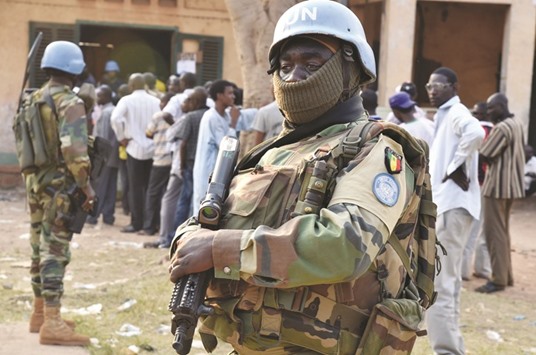UN troops stood guard over the main vote-counting centre in Bangui yesterday after a peaceful election in the Central African Republic aimed at turning the page on years of inter-religious violence.
Voters turned out in vast numbers for Wednesday’s often-delayed presidential and parliamentary elections, which went off without major incident and were hailed as “a success” by the head of the UN mission MINUSCA, Parfait Onanga-Anyanga.
UN forces operating in the deeply poor country alongside French troops helped to ensure that polling stations stayed open late into the night so people could vote.
But the country may have to wait at least a week to learn the outcome of the election, which residents hope will restore stability after three years of brutal conflict that has left tens of thousands dead and many more homeless.
Three men who have all held high political office in previous governments are the front-runners in the 30-strong presidential race, but all three previous heads of state were barred from taking part.
The mostly Christian country has been rocked by violence since president Francois Bozize was ousted in a March 2013 coup by the mainly Muslim Seleka rebel alliance, which installed Michel Djotodia, the first Muslim head of state.
Both now face international sanctions over the fighting that pitted mainly Islamic rebels against vigilantes from the Christian majority.
When Djotodia quit in January 2014 under international pressure, his Seleka rebels were running amok even as new president Catherine Samba-Panza was sworn in to oversee a transition to the new elections.
The savagery unleashed by the mainly Christian “anti-balaka” (anti-machete) vigilantes in response to atrocities by Seleka forces has cost thousands of lives and driven a tenth of the 4.8mn population to flee their homes in the mainly rural nation.
As the National Elections Authority (ANE) began the count, a UN armoured car and cement barriers were placed outside the main tallying centre in Bangui yesterday to prevent any attacks by supporters of disgruntled politicians.
The enthusiasm of the electorate with a clear desire for peace was hampered by some organisational glitches that led to delays in polling in some areas, but nobody has denounced widespread fraud and there were no reports of major violence.
A second round of voting is to take place on January 31.
Prominent candidates have already declared themselves pleased with Wednesday’s polls.
“The results are very, very satisfying,” one-time prime minister Martin Ziguele told AFP. “My party (the Centrafrican People’s Liberation Movement) is getting high scores in zones where we’re not deeply rooted, while in ‘our’ regions, the scores are Soviet-style!”
Aides to Anicet Georges Dologuele, who also served as prime minister, said that he was “largely ahead” in most constituencies in Bangui and in several key provincial towns.
The last of the three favourites, Karim Meckassoua, a Muslim who served as foreign minister among other government roles, could not be reached for comment.
Archange Touadera, who was prime minister under Bozize until Seleka overthrew him, is now also said to have emerged as a possible contender for the top job.
The ANE on Wednesday admitted to “material errors on voting slips” in several parts of Bangui as well as in the provinces and said that parliamentary by-elections will need to take place at an unspecified date to right the wrongs.
While both UN and French troops have turned out in force to provide security, some units of the Central African Armed Forces (FACA) have also deployed in unusual strength, with the advantage of familiarity with the terrain.
At their height, the unprecedented murderous attacks on Christian and Muslim communities alike led to fears of genocide.
International military intervention alongside an African force already in the country was spearheaded by former colonial ruler France.
The CAR possesses considerable mineral wealth but after years of misrule studded with coups, army mutinies, rebellions and general strikes, the economy is in ruins, propped up by international donors.

Senegalese UN peacekeeping forces stand guard as people wait to vote at a polling station during presidential and legislatives elections in the streets of the Muslim PK-5 district of Bangui on Wednesday.
